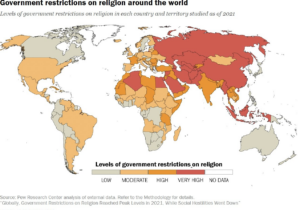After the outbreak of the coronavirus pandemic in China in December 2019, the world has been turned on its head, as former Prime Minister of Australia Kevin Rudd recently wrote. As of the writing of this essay, the pandemic has caused over 430,000 deaths worldwide, infected close to eight million, and deepened already impossible economic conditions for millions. It worsened hunger and the spread of other infectious diseases while postponing indefinitely the realization of the UN Sustainable Development Goals. The pandemic is also putting at risk basic civil liberties for populations around the world. For religious minorities, the future is more uncertain than for most: it can be truly an existential crisis. As a consequence of authoritarianism advancing on a global scale, public policies failing to address development needs across the world, rising extremist violence by non-state actors, and growing social hostilities—religious minorities are now more exposed and vulnerable. In what follows, I argue that freedom of religion and the freedom to enjoy material wellbeing are linked to economic empowerment.
Uncertainty Ahead
As the pandemic forced economies into lockdowns globally, the world has become anxious and fragmented, leaving the global order’s future uncertain. The pandemic will likely have a devastating impact on not only the developing nations but also developed Western countries, who will struggle to maintain the social safety net. A fracture in traditional alliances will likely lead to a global realignment, with implications for the distribution of global power and the projection of influence. This will challenge efforts to safeguard Western liberalism, at the core of the post-war world order. Fundamental freedoms, including freedom of religion or belief, risk fading into irrelevance.
How relations among established powers like the United States or the European Union on one hand, and emerging actors like China and developing countries like India will change remains to be seen. These actors’ ability to shape one another will be crucial in shaping the global order. So will the future unfold along liberal values of political and economic openness, democracy, rule of law, and multilateralism? Or will the global order reject open economies and societies that respect fundamental freedoms, and instead stress sovereignty and non-interference?
Living on the Edge
In times of crisis, the most vulnerable are most at risk: the poor, the homeless, the unemployed, the economically marginalized. The most vulnerable are not a homogenous group, but diverge by age, gender, ethnicity, or location, which suggests that equity-sensitive economic policies are indispensable to break down the barriers of their exclusion. Yet the politically marginalized religious minorities, a significant part of numerous countries, are often at an even higher risk. Religious minorities also face discrimination, social stigma, hostility, or extreme violence in both free and authoritarian societies.
So politically marginalized religious minorities will likely continue facing a “double-layered discrimination.” Their access to economic growth will remain restricted. Pushed into the informal and unregulated sectors of the economy, they will live in uncertainty while dependent on social safety nets if they exist, or outside any social protection, including access to essential healthcare services. In low-income countries, around one in five of the poor lacks a safety net. With the global health crisis, the future for the most vulnerable looks rather bleak. Therefore, as victims of the pandemic, both the economically impoverished and the religiously oppressed need protection and support.
Freedom of Religion under Threat
Freedom of religion or belief was in peril globally for decades. Research by the Religious Freedom and Business Foundation shows religious restrictions and hostilities adversely affect business activity and investment, indicating a positive correlation between religious freedom and economic growth. The 2020 report of the US Commission on International Religious Freedom (USCIRF) recommended that Burma, China, Eritrea, Iran, North Korea, Pakistan, Saudi Arabia, Tajikistan, and Turkmenistan be re-designated as countries of particular concern (CPC). The report further recommended that India, Nigeria, Russia, Syria, and Vietnam be designated, too. These CPCs are where the government engages in or tolerates “particularly severe” violations of religious freedom. Except for democratic India, the list of CPCs includes authoritarian governments that consider minorities a threat to their rule.
Some authoritarian regimes demonstrate growing readiness to promote their domestic policies abroad, shaping the international human rights discourse. The Chinese leadership, for example, claims it developed better solutions for mankind’s problems, including its model of fighting terrorism, separatism, and extremism at home. Beijing’s attempt to build a community of common destiny for mankind presents more a challenge than a viable alternative in the eyes of democratic leaders. Moreover, Beijing tried to shift the international narrative by claiming that strong centralized leadership, rather than democratic governance, performs better in a pandemic. Amid these developments, there is only one certainty: more hardship for religious minorities looms on the horizon.
Hostility on the Rise
During the pandemic, religious discrimination has to be viewed in conjunction with three elements: (1) the nature of the political system, (2) the extent of social and cultural harmony in the given society, and (3) the level of influence non-state actors have to shape social harmony, particularly entities committing extremist acts against religious minorities. These factors influence the authorities’ capacity to address the pandemic and discriminated groups’ readiness to cooperate. Finally, religious minorities’ trust of the government, or lack thereof, plays a central role in dealing with the pandemic.
As authoritarian governments become increasingly repressive at home and more assertive abroad, political freedoms face limitations, often in violation of constitutional guarantees. Non-state actors, such as Boko Haram or Islamic State (ISIS), continue to commit violent extremism and terrorism, targeting religious and ethnic minorities and forcing governments to strengthen national security. In some cases, this has led to a competition between religious freedom and national security, increasing discriminatory practices that target particular faiths perceived to be linked to terrorism, to the detriment of a mutually reinforcing relationship between the two.
The pandemic, portrayed as both a public health and security threat, brings a new excuse to increase control. Socially, authoritarian regimes’ restrictive policies increase discrimination. Yet hostilities have increased in non-authoritarian regimes, too. Often embracing racism, nationalism has risen and affected democratic states. Interreligious tension, such as sectarian clashes between Hindus and Muslims, has occurred in India, the world’s largest democracy.
Lives at Stake
In China, the Uighur religious ethnic community in the Xinjiang Uighur Autonomous Region (XUAR) remains vulnerable under the pandemic. One to two million Uighurs remain in detention camps, undergoing communist patriotic education and suffering conditions that make them especially vulnerable to the virus. President Xi Jinping reportedly uses the pandemic to increase persecution, with reports that the authorities have used Uighur slave labor to keep factories running in other Chinese provinces, because “Uighur lives don’t matter.”
The situation of the forcibly displaced Rohingya has become more difficult, adding to the persecution they began facing in 2016 from the Myanmar government, described as a textbook example of ethnic cleansing. Hundreds remain stranded at sea without access to food, water, and medical assistance, reminding us why the world must fight the root cause of their stateless situation, which is on religious grounds. Afghanistan’s already dwindling Sikh and Hindu minority communities, part of the country’s multicultural tapestry, continue living between terrorist violence and an exodus, intensified under the pandemic. In Iran, up to 100 imprisoned Baha’is have become more vulnerable under the threat of the virus, having their human rights already violated by being wrongfully imprisoned for practicing their beliefs. The regime considers the nation’s estimated 300,000 Bahai’s heretics with no religion.
Longstanding Islamophobia exacerbates anxiety over the virus in India. The Tablighi Jamaat Muslim group faces increased violence from nationalist Hindu groups, who accuse them of spreading the virus. Islamophobic hashtags, such as #CoronaJihad, proliferated across social media, further dividing an already fragile society. In Sri Lanka, the pandemic fuels ethno-religious tensions, linked to antipathy toward minority Muslims, who are accused of spreading the virus. The Christians of Ethiopia, Sudan, and Cameroon are vulnerable and face new forms of persecution because of their faith and the pandemic. In Uganda, extremists even blame Christians for the pandemic, and in Nigeria’s Middle Belt, Christians live in a survival culture. In South Korea, a healthy democracy, resentment against members of the Shincheonji church challenged the authorities’ efforts to stop the spread of the pandemic. Fearing social stigma, members of the religious group hesitated to identify themselves, revealing the fragility of democracies.
The Missing Link – Economic Growth and Freedom of Religion
Addressing the root cause of the double-layered discrimination that religious minorities endure is vital to ensuring inclusive economic growth. Any reflection on exit strategies must consider the relationship between economic growth that benefits all, and freedom of religion. For sure, the economic costs of COVID-19 are very high. The macroeconomic impact is believed to be larger than any other catastrophic event in the past four decades. But the human cost might just be higher. The time is now to link economic growth for all and freedom of religion.
Research demonstrates that respect for religious freedom has positive social and economic outcomes, including economic growth. Putting freedom of religion or belief into practice reduces corruption and increases peace and growth because normal economic activities are not vulnerable to disruption and foreign direct investment can contribute to sustainable growth. As religious populations play an increasing role in public life, government and social initiatives to integrate them are vital, as well as corporate engagement that promotes their inclusion. Research shows a robust connection between the lack of government respect for religious freedom and higher levels of social hostilities involving religious freedom.
Fighting religious discrimination during the pandemic requires an economic and socio-political focus at once. The objective should be an equitable distribution of economic opportunities, which guarantees that everyone can sustain an acceptable level of basic human development. Economic assistance that reduces poverty is vital to help both the economically and politically marginalized. Such assistance must also contribute to long-term sustainable goals, coupled with public policies aimed at promoting food security, eliminating preventable diseases, or ensuring basic education for all. To maximize the impact of sustainable growth on poverty, however, containing inequality must be a policy objective. This means introducing economic relief measures that benefit all, irrespective of religious beliefs. Investing in social protection programs for all will allow embracing the economically and politically marginalized at once. Fighting religious persecution also means addressing Islamophobia in India, ending the persecution of Uighurs in China, releasing the unlawfully imprisoned Bahai’s of Iran, welcoming the forcibly displaced Rohingya, accepting the Christians in Nigeria, and embracing members of the Shincheonji church. It means ending the persecution of all religious minorities.
In a blink of an eye, the pandemic upended everything. But the crisis is an opportunity to reconsider everything that was upended. The pandemic must not be used to further curb freedom of religion. It must be used to embrace, integrate, and educate. The responsibility falls as much on governments that restrict freedoms as on societies that reject “the other.” Most importantly, the biggest responsibility lies with democratic governments and societies, who must resist the authoritarian advance and champion freedom of religion while investing in global health security for all. Leaders must acknowledge that what’s good for public health and human dignity is not only good but also vital for the economy. The world needs an economy that promotes public health and the ability of all to flourish.







 Sponsor a student for Christianity & National Security 2024
Sponsor a student for Christianity & National Security 2024